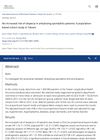TLDR Ankylosing spondylitis does not increase the risk of hair loss.
A population-based cohort study in Taiwan investigated the association between ankylosing spondylitis (AS) and alopecia using data from over 1,000,000 patients. The study included 3,640 patients with AS and 14,560 non-AS controls. The results, analyzed using the Cox proportional hazard model and Kaplan-Meier analysis, showed no statistically significant increased risk of developing alopecia in AS patients, with both crude and adjusted hazard ratios being 1.16. Subgroup analyses by age and gender also showed no significant risk. However, a significant positive correlation was found between atopic dermatitis and alopecia, with an adjusted hazard ratio of 8.05. Overall, the study concluded that there was no increased risk of alopecia in patients with AS.
 148 citations
,
December 2018 in “Journal of autoimmunity”
148 citations
,
December 2018 in “Journal of autoimmunity” Alopecia areata is an autoimmune disease causing patchy hair loss, often with other autoimmune disorders, but its exact causes are unknown.
 2 citations
,
January 2014 in “Journal of clinical and investigative dermatology”
2 citations
,
January 2014 in “Journal of clinical and investigative dermatology” Some drugs used to treat immune conditions may cause different types of hair loss.
106 citations
,
January 2013 in “Clinical and Developmental Immunology” Alopecia areata is caused by immune system attacks on hair follicles, often triggered by viral infections.
 41 citations
,
January 2009 in “International Journal of Trichology”
41 citations
,
January 2009 in “International Journal of Trichology” 58% of men aged 30-50 have hair loss, with severity increasing with age.
143 citations
,
January 2004 in “Journal of Investigative Dermatology Symposium Proceedings” Alopecia areata is an autoimmune disease causing hair loss, treatable with immune-modulating drugs, and linked to genetics.
 1 citations
,
July 2022 in “International Journal of Rheumatic Diseases”
1 citations
,
July 2022 in “International Journal of Rheumatic Diseases” People with ankylosing spondylitis in Taiwan don't have a higher chance of getting alopecia.
1 citations
,
December 2023 in “Molecules/Molecules online/Molecules annual” JAK inhibitors show promise for treating various skin diseases.
 January 2024 in “American journal of clinical dermatology”
January 2024 in “American journal of clinical dermatology” Ritlecitinib is safe and well-tolerated for treating alopecia areata in patients aged 12 and older.
 4 citations
,
May 2025 in “Frontiers in Immunology”
4 citations
,
May 2025 in “Frontiers in Immunology” JAK inhibitors effectively and safely treat alopecia areata with few serious side effects.
12 citations
,
March 2023 in “Frontiers in immunology” Atopic dermatitis increases the risk of some autoimmune diseases.





